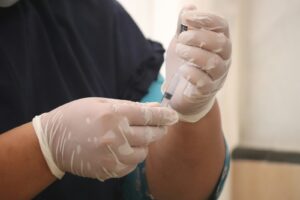Hospital On ‘Black Alert’ Due To Winter Pressures
A hospital in Greater Manchester has declared a black alert due to ‘heightened pressure,’ Bolton NHS Foundation Trust has said.
The Royal Bolton Hospital declared the alert, which is the highest level of escalation in the NHS, on Monday (December 9).
Rae Wheatcroft, deputy chief operating officer at Bolton NHS Foundation Trust, said the situation at the hospital has eased but attendance at Bolton A&E is still high.
‘The Royal Bolton Hospital was particularly busy yesterday however the situation de-escalated within a few hours – pressures such as these are a snapshot in time as they fluctuate. Our staff have worked hard to keep patients safe at all times.
‘The situation has eased although we are still busy with high attendances at A&E. There are a lot of winter bugs around at the moment, and we ask people not to come to the hospital if they have had sickness, diarrhoea or flu-like symptoms within the past 48 hours.
‘In Bolton, GPs offer extended hours appointments, your local pharmacy can offer advice and you can contact NHS 111. Please choose well and only visit A&E if necessary.’
According to NHS England, a black alert is triggered when the system is under severe pressure, unable to deliver comprehensive emergency care and when patient safety is at risk.
We are experiencing a busier period than usual at Royal Bolton Hospital. In Bolton GPs offer extended hours appointments, your local pharmacy can offer advice and you can contact NHS 111. Please choose well and only visit A&E if necessary. pic.twitter.com/rH0hm7Wzni
— boltonnhsft (@boltonnhsft) December 9, 2019
On Thursday (December 5) NHS England said hospitals in England had been ‘forced’ to close more than 1,100 hospital beds over the previous week in a bid to stop the spread of norovirus.
Health bosses are urging those who catch the vomiting bug not to go back to work or school until at least 48 hours after symptoms pass, to avoid passing it on to others. And are encouraging those who need it to seek help from the free, 24/7 NHS 111 phone and online service rather than going to hospital or their GP, where they risk infecting others.
Nick Phin, National Infection Service deputy director at Public Health England, said: ‘Cases of norovirus are at higher levels than we would expect to see at this time of year, although this is not unprecedented.
‘Practising good hygiene is one of the best ways to protect against norovirus. This includes thorough hand washing with soap and warm water after using the toilet and before eating or preparing food.
‘We advise people not to visit GP surgeries and hospitals with symptoms. However, if they are concerned they should contact NHS 111 or talk to their GP by phone.’
Photo Credit – Pixabay















